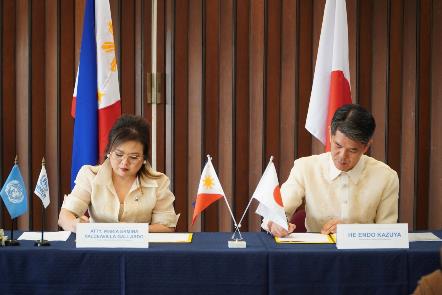

MANILA – The Government of Japan has approved a grant to the UNHCR, The UN Refugee Agency, for a 30-month initiative to improve access to birth registration services of marginalized populations in the Bangsamoro Autonomous Region in Muslim Mindanao (BARMM).
This was formalized during the signing and exchange of notes by Japanese Ambassador to the Philippines ENDO Kazuya and UN High Commissioner for Refugees (UNHCR) Philippines Head of National Office Maria Ermina Valdeavilla-Gallardo in Pasay City last Tuesday, 11 June 2024.
In a statement, the Japanese Embassy confirms that the Government of Japan will contribute ¥858,000,000 (approximately US$5.5 million) to significantly enhance this project and expand coverage to decommissioned combatants and their families, which is in line with the efforts to contribute to the normalization process under the Comprehensive Agreement on the Bangsamoro.
According to data provided by the UNHCR, while the national birth registration rate in the Philippines is at 96.6%, there remains a significant disparity with BARMM at 77%. In addition, all provinces in the region are at the bottom ten of the lowest proportion of registered births in the country.
“These gaps in birth registration increase the risk of statelessness, as the absence of a birth certificate makes it difficult to prove one’s legal identity. This also causes challenges in terms of access to basic rights such as education, healthcare, employment, and freedom of movement. Without access to these rights, they can face a lifetime of obstacles,” UNHCR stated.
Meanwhile, the Embassy mentioned that within the 30-month program period, this project will work on the following: conduct capacity building for local government/Local Civil Registrars; provide IT equipment for digitization of the process and the equipment for mobile birth registration caravans; conduct birth registration of 30,000 individuals; conduct awareness-raising activities in target communities and development assistance for communities in the form of a quick impact project.
By establishing the necessary mechanisms and systems, the project will contribute to the overall improvement of birth registration in the region by reaching 92 percent of the estimated one million unregistered individuals, with 130,000 benefitting in the next 30 months and 800,000 more indirectly benefiting in the next 10 years, the Japanese Embassy added.
In his speech, Ambassador Endo expressed hope that the continued collaboration between the UNHCR and Japan in BARMM through the project would cultivate “an environment conducive for prosperity and sound growth” where its residents “can continue to enjoy the dividends of peace.”
He also extended his gratitude to the UNHCR for proposing the project, describing it as an embodiment of the Humanitarian-Development-Peace (HDP) Nexus concept upheld by both the UNHCR and Japan.

(Photo courtesy of Embassy of Japan in the Philippines)
In response, UNHCR has provided support to the Ministry of Social Services and Development (MSSD) of the Bangsamoro Government through the birth registration of the itinerant seafaring Sama Bajau people and unregistered children in the context of displacement due to armed conflict in BARMM since 2021.
However, the UNHCR lamented that the initiative continued to face numerous challenges in registering the birth of the target populations, including the lack of understanding on the importance of birth registration, difficulties in accessing the target communities, and erroneous data entries.
The funding aims to expand the birth registration initiative covering 50 municipalities in Maguindanao Del Sur, Maguindanao Del Norte, Lanao del Sur, Basilan, Sulu, and Tawi-Tawi from 2024 to 2027, UNHCR explained.
Priority municipalities will receive support through digitization and capacity building of local governments and the Local Civil Registrars (LCRs) as well as advocacy activities that will highlight the importance of birth registration and sustainability of the initiative, UNHCR continues
For her part, Valdeavilla-Gallardo shared that UNHCR is pleased to be working with the Japanese Government to ensure that marginalized populations in the Bangsamoro region have access to birth registration.
“The efforts to be launched through this funding is vital to achieving SDG 16.9 on providing legal identity for all, the 2030 Agenda of leaving no one behind, and the Philippines’ National Action Plan (NAP) to End Statelessness,” she said.




